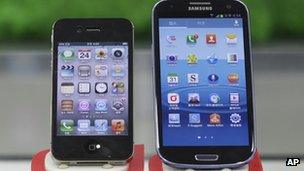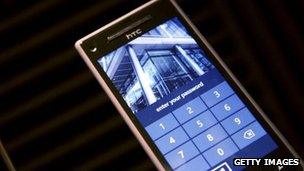Apple v Samsung: Judge rejects Apple plea for sales ban
- Published

Apple and Samsung have been involved in a legal battles in a number of countries
A US judge has rejected Apple's plea to ban sales of Samsung's smartphones that violate its patents.
Apple had requested the ban after a jury ruled earlier this year that some Samsung products had infringed Apple's patents.
Samsung was also ordered to pay $1.05bn (£650m) in damages, a ruling the South Korean firm has since challenged.
However, the judge said there was not enough evidence that the infringed patents had hurt Apple's US sales.
"The phones at issue in this case contain a broad range of features, only a small fraction of which are covered by Apple's patents," District Judge Lucy Koh said.
"Though Apple does have some interest in retaining certain features as exclusive to Apple, it does not follow that entire products must be forever banned from the market because they incorporate, among their myriad features, a few narrow protected functions."
Losing steam?
Since winning $1.05bn damages in August this year, Apple has suffered setbacks in its various legal clashes with rivals.
Last month, Apple was asked to disclose the details of its patent-sharing deal with HTC to Samsung.
It has also lost an appeal against a UK ruling that Samsung had not infringed its design rights.
The US technology firm was also asked by a UK High Court to publish a statement on its website admitting that Samsung had not infringed its designs.
Meanwhile, sales bans sought by Apple against Samsung's Galaxy Nexus phone and Samsung's Galaxy Tab 10.1 tablet computer in the US were also lifted in October.
In November, a judge in the US dismissed a case brought by Apple alleging that Google's Motorola unit was seeking excessive royalty payments for patents.
"The momentum that Apple had gained in the wake of the big billion dollar judgement seems to be losing its steam," Manoj Menon, managing director at consulting firm Frost & Sullivan told the BBC.
"It appears that Apple will find it increasingly difficult to convince courts around the world that it has been hurt by alleged patent infringements."
Patent sharing
The smartphone market has seen tremendous growth over the past few years and Apple and Samsung have emerged as two of the biggest players in the sector.
The success of Apple's iPhone has been a key driver of its growth, while Samsung has reported record quarterly profits helped by the popularity of its Galaxy range of smartphones.
However, as their market share has increased, so has the intensity of their legal battles with each other.

Apple and HTC have signed a licence agreement that ended their legal battle
The two firms have filed legal cases against each other in more than 10 countries, each accusing the other of violating its patents.
However, analysts said that it was time the two companies sat down together and agreed on an amicable solution to their tussles - a move that has also been suggested previously by a judge in the US.
Mr Menon of Frost & Sullivan said that as manufacturers look to develop even more advanced phones, they will eventually need to use technologies, the patents for which may not belong to them.
"What we are seeing is a convergence of different technologies into one device," he said.
He explained that for innovation to continue in the sector it was key that various companies agreed to licensing terms for their patents.
Last month, Apple agreed such a deal with Taiwanese phone-maker HTC as it signed a 10-year licence agreement that ended their legal battle over patents.
- Published11 November 2012
- Published1 November 2012
- Published18 October 2012
- Published25 August 2012